Why can't you make fun of people behind their backs like a normal person?
Media Literacy, Lolita, and The Death of Slim Shady
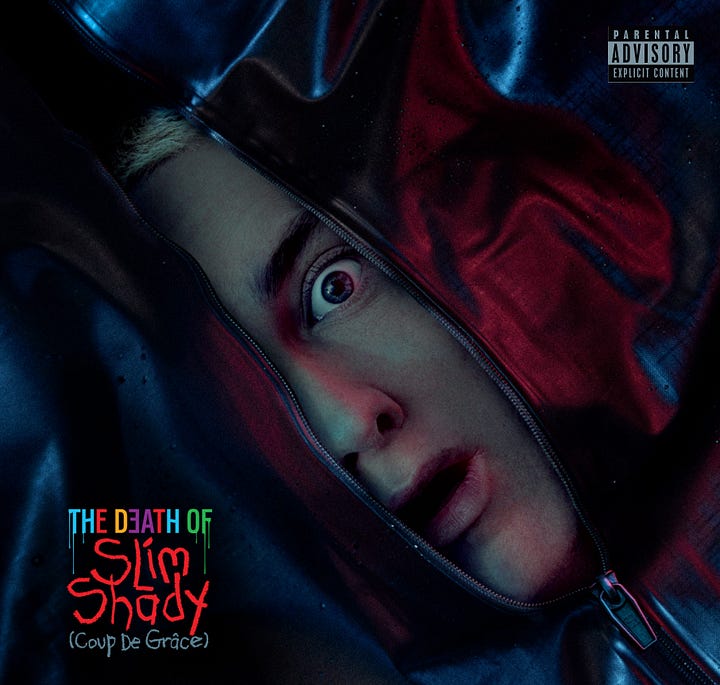
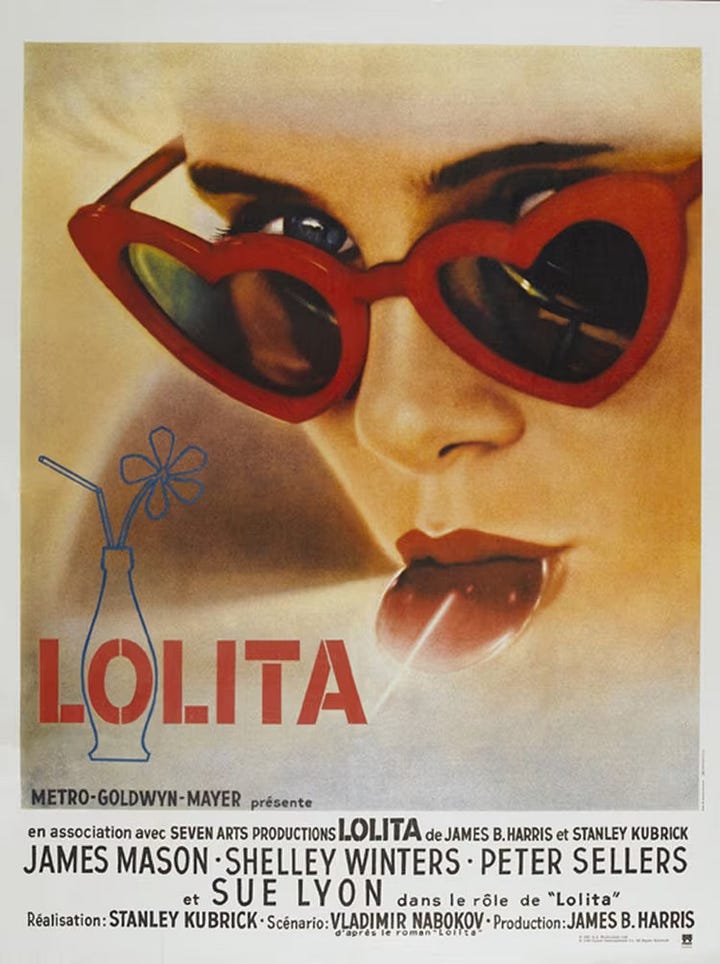
I.
The central challenge Eminem’s music poses has always been, “Do you get it? Are you listening? Can you read?” Eminem is a true linguistic autodidact—he would read the dictionary every day as a kid so he could keep for himself a larger arsenal of rhymes. Unfortunately, we live in the least literate time in post-industrial history. Worse, nobody even likes art, they only care about image and branding. “Music taste” is an item on your D&D character sheet, not an affection for artistic genius.
I’m not here to give you a review of The Death of Slim Shady. I’m a musical dilettante, and I’m certainly not a redditor, critic, or journalist. Rather, I’m here as a student of literature and of hip-hop, and I aim to deliver a proper account of this album and its impact on the culture writ large.
Eminem albums are always a touchy subject for people these days because everyone has to admit that they enjoy them, gleefully or begrudgingly (except Revival). Eminem is a classic musical poet who has dropped a few classic albums. I think the best quote on the subject is:
As such, for liberals, and for liberally-socialized generations—Zoomers, Millennials—the Eminem listening experience often involves an awakening of an inferiority complex of taste. This complex manifests as a confusion about the imaginative expansion which Eminem’s music infuses in the listener—and this imaginative expanse’s irreconcilability with the listener’s conflicting social and political commitments begets attempts on the art itself, from projection to rejection. Thankfully, as Twitter’s preeminent student of hip-hop and Eminem, I’m here to clear up the fog of war that comes with an Eminem drop, and to demystify the musical and social media landscape.
II.
A popular understanding of The Death of Slim Shady is that Eminem is “just kidding”--that all the offensive jokes about marginalized groups are just satire about Slim Shady and how his old self sucks and is cringe. Hip-hop redditors and liberal women are the primary champions of this theory. They rely on two premises. First, that “Guilty Conscience 2” steps out of the narrative to “clarify” that “I didn’t mean it” and “I hate the old me & I hate that I am this way.” Second, that “it’s all so silly and insane, surely he’s just going overboard.”
This is a motivated way of listening to the album. The question you have to ask these people is, “Then do you think that he actually like Candace Owens, or was he kidding when he called her a race traitor?” As Harry Bergeron said, “I think he actually means it.” To act like Eminem is “satirizing Slim Shady” is to project what such a listener hopes Eminem would do, in lieu of the face value of the artistic choices made on the record.
That projection comes from a contempt for the sort of person who enjoys Eminem’s work for what it is—out of pocket, offensive, funny, cartoonish—and really what this particular listener vindictively wants is for Em to betray his dedicated fans and take this listener’s “side” on his own music. Plainly, they want Eminem to sell out to Democrats, because they stereotypically view a “fan of old Eminem” as a “stupid chud republican,” someone who just likes saying “faggot” & “retard” and doesn’t know that Eminem actually hates republicans.
Another group of listeners experiences this very same political anxiety, but they express a little more honesty about the form & content of the album. These people dislike the album (often “despite the skill”) because, as they say, it’s frustrating to hear him talk about Caitlyn Jenner and midgets and trans people and “cancel culture.” As this group sees it, no one really cares about Eminem and no one’s actually trying to “cancel” him.
Again, this is anxious and motivated. First, the ultimate factual controversy as to whether anyone is “really cancelling Eminem” is immaterial to the album itself. The album builds a world in itself—a fictional scenario (based on real events, wink wink)—where people are in fact softer than they already are, and they start “protests outside of Shady offices livid,” and proceeds from there. This is an incredibly uncomfortable world that Eminem has built for them because it (correctly) metaphysically aligns them with the evangelical Christians and gay activist groups like GLAAD of the early 2000s.
Second, the allegation that “talking about cancel culture is corny, it isn’t real” is itself a “cancelling” response. It puts the motivations of “wokeness” above suspicion (“How did we get stuck in this woke BS? I'm tryna make it regress, fuck 'em”) and throws Em in with the chuds and rubes. After all, being offensive and rude is what “stupid chud republicans” do. And stupid chud republican rubes are the target group for “cancellation” and, in their own way, have already been “cancelled” categorically. So if Eminem is “acting like a stupid chud republican,” that means he sucks, his music sucks, he’s low status, and he should be rebuked and ignored. What else is there to “cancellation,” really? They’re just describing a “problematic” person and their discomfort with such an individual. What really bothers them is that he’s so high status despite all his improprieties, and they have no means of really damaging him personally—so they manufacture an illusory perception of a significant cringing public to deter curious newcomers (this is all they can do).
What’s so interesting about the reception of The Death of Slim Shady is that it elicits the exact reactions from the exact people it targets despite doing so little. The “offensive content” is mostly just quips and jokes, and he goes the entire album without saying “faggot.” Ironically, I think not saying the f-slur this time around is more contemptuous, because you’re left with the impression that he could say it if he wanted to, and yet he mercifully exercised restraint.
The final group I will analyze is the faction of Shady-anxious listeners who hoped The Death of Slim Shady would be a “mature album” in which he outright disowns and relinquishes the Slim Shady persona, opting instead to make “mature songs” (whatever that means, presumably songs about “social justice” &c.). These people are motivated by animus against the stupid Eminem fan who “hasn’t left his high school days behind” and “needs to grow up and realize that Eminem isn’t appropriate anymore, like me, a grown adult.” There are a few things going on here.
The “enjoyer of a hypothetical mature Eminem” is attempting to reconcile his youthful love for Eminem with his journey into Progressive moral sensibility. For this type of anxious liberal, Eminem is the media timestamp for a phase in his life where he was “problematic and didn’t know better.” Essentially, he/him believes it is “morally wrong” to “unironically” like Eminem. For people like this, “escaping Eminem fandom” is a rite of passage out of “stupid chud conservatism” into “enlightened tolerant liberalism. So they feel guilty—you might say they have a guilty conscience—when they find themselves enjoying an Eminem song. For some of them it’s gotten so bad that they “can’t stomach” listening to even the 2000s Eminem classics—and not because they’re vile, but because they feel their artistic sensibilities slipping into a time with which they’ve associated much guilt-infused moral trauma.
Furthermore, implicit in this solicitation of a “mature old rapper” is this narrow conception of the progress of masculinity over time. Liberals have this very limited view of masculine maturity where a guy gets to be middle-aged and has a “mid-life” crisis where he has to work through gratuitous self-loathing. He does so primarily by way of apologizing to everyone he knows (especially his kids, his wife &c.) until he’s too old to stay mad at. The desire here is for Eminem to embody the ideal liberal dad who feels guilty about his old ways and is now harmless and nice to everyone for niceness’ sake. The conditions under which they’ll forgive Eminem for saying “faggot” are the same as those under which they’ll forgive their fathers.
III.
What we’re dealing with here is the slew of possible interpretations of The Death of Slim Shady from the standpoint of “media literacy.” The most notable recent “media literacy” event was the discourse surrounding Lolita and its categorization as a “love story.” Infamous twitter villain JK Rowling posted that Lolita was a tragic love story, and immediately liberals, who already had a bone to pick with her for being a TERF, lobbed slander at her, screaming that she was disgusting and stupid and accused her of being a pedophile. The central argument was: Lolita is not a love story because Humbert at times admits that he is perverted, and Nabokov, as a genius, knew pedophilia was wrong and wanted to write a book about how bad pedophilia is. It thus “couldn’t be a love story because it’s about pedophilia and pedophilia is not love.”
The same “media literacy” techniques are being deployed here to sanitize Eminem (because you can’t remove him from the historical poetic canon). The long syllogism is thus: The Death of Slim Shady is about “Slim Shady vs. Eminem.” Therefore, Slim Shady and Eminem do not and cannot agree or be aligned on anything. Slim Shady says all the taboo things, Eminem does not. Eminem, like Humbert, admits the taboo is inappropriate. Genuine feelings are genuine, not inappropriate. Therefore, the “taboo things” can’t reflect any “genuine feelings” because genuine feelings aren’t taboo & aren’t inappropriate.
This is a retarded view of course, of both pieces of literature. And this makes sense when you realize and are honest about both Humbert’s (pedophile) and Slim Shady’s (serial murderer, brutal rapist, drug addict) redeeming qualities. For example, Humbert is a romantic. Slim Shady is honest, confrontational, and stands up for himself and for the truth. Slim Shady is the mythopoetic archetype of the meme, “The worst person you know just made a great point.” See:
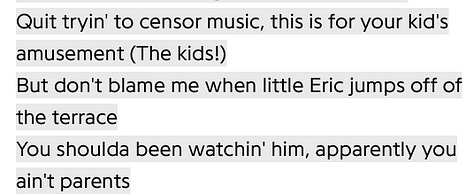
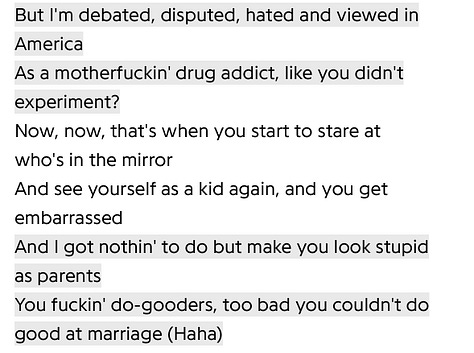
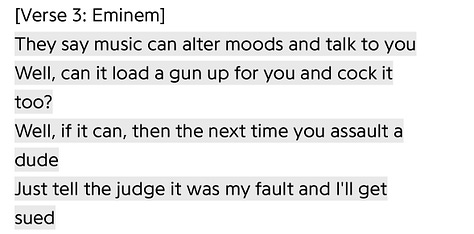
Slim Shady is the objective Christian scientist who checks the sentimental liberal moralist. Indeed, perhaps the grandest and most deliberate misreading of Slim Shady is that he is original sin incarnate, the vile tempter in the desert always trying to coax you into doing what’s wrong. On the contrary, Shady is the conscience.
The Death of Slim Shady is rife with moments where the kind, humble moralist who wants to just do right by everyone is put in place by Shady as the conscience. “I gotta memorize pronouns of a cis man?” “Marshall gives a fuck and pretends he doesn’t!” “Marshall is Dre and Jimmy’s puppet!” Sarcastically, “We should coddle fat people.” Other times, it’s Eminem as the conscience regulating the brutally honest, antisocial Slim Shady. “You're still mentally thirteen…” “You rip on paraplegics, man, seriously? …it’s embarrassing.”
What the album really is, objectively, is a story about the struggle of exercising discernment with a free conscience, a conscience oriented towards two, respectable values which sometimes cross swords: truth & generosity. And the two combatants come to blows from a place of respect for the other. Slim Shady distributes the truth in generous quantities, and Eminem is generous with the truth. Slim is brutally honest, Eminem rationalizes. To this day, the dialectic between Eminem & Slim Shady represents the American conscience perfectly. And I’ll give the libs credit, their intuition on this is spot on. Eminem represents the left, and Slim Shady represents the right. Either way, you’ll have a guilty conscience.




